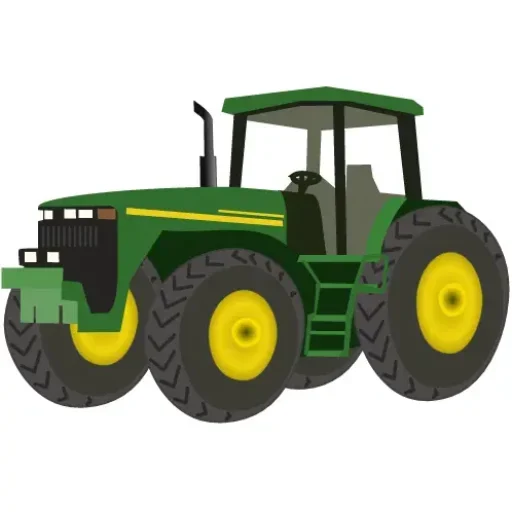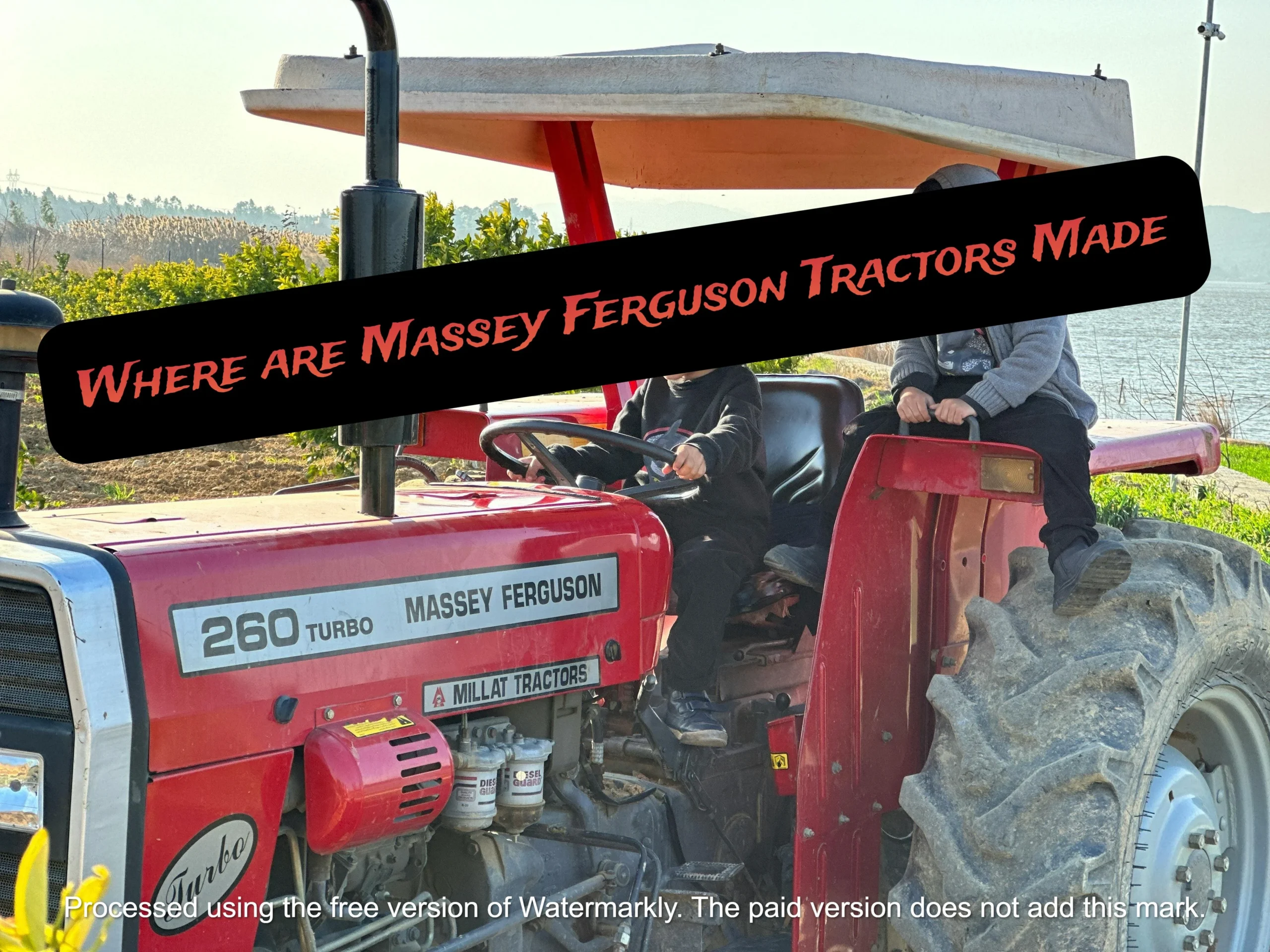Massey Ferguson tractors are manufactured in various locations around the world, including the United States, France, Brazil, and India. The company, a well-known brand in agricultural machinery, utilizes these global manufacturing facilities to meet the diverse needs of farmers worldwide. Each location contributes to the production of different models, ensuring a broad range of options for customers while also facilitating efficient distribution and servicing networks.
Introduction
Massey Ferguson is a prominent global brand renowned for its exceptional range of agricultural machinery, particularly tractors. With a rich history spanning over a century, the company has established itself as a trusted name in the farming community. One of the most frequently asked questions among farmers, enthusiasts, and curious minds alike revolves around the manufacturing locations of Massey Ferguson tractors. This comprehensive article delves into the fascinating journey of where these mighty workhorses are born, exploring the company’s global manufacturing footprint and the factors that influence their production sites.

A Merger of Two Pioneering Companies
The Massey Ferguson brand traces its roots back to the merger of two pioneering agricultural equipment manufacturers: Massey-Harris of Canada and Ferguson Inc. of the United States. In 1953, these two powerhouses joined forces, combining their expertise and innovation to create a formidable force in the tractor industry.
The Early Years
In the early years following the merger, Massey Ferguson’s tractor production was primarily concentrated in North America. The company’s main manufacturing facilities were located in:
- Brantford, Ontario, Canada (Massey-Harris)
- Racine, Wisconsin, United States (J.I. Case)
- Detroit, Michigan, United States (Ferguson Inc.)
These locations served as the initial hubs for Massey Ferguson’s tractor production, catering to the growing demand for agricultural machinery in the North American market.
Global Expansion and Manufacturing Footprint
Diversifying Production Locations
As Massey Ferguson’s global reach expanded, the company recognized the need to establish manufacturing facilities closer to its customer base in different regions. This strategic move aimed to reduce transportation costs, improve supply chain efficiency, and better serve local markets.
Massey Ferguson Tractor Manufacturing Plants Worldwide
Today, Massey Ferguson tractors are produced at various manufacturing facilities located across multiple continents. Here are some of the key production sites:
Location Country Beauvais France Canoas Brazil Changzhou China Hosur India Kyushu Japan St. Valentin Austria Turkey
This global manufacturing footprint enables Massey Ferguson to cater to the diverse needs of farmers and agricultural professionals worldwide, while also reducing the environmental impact of long-distance transportation.
Tailored Production for Local Markets
Massey Ferguson’s manufacturing strategy involves tailoring its tractor production to meet the specific requirements of local markets. Factors such as terrain, climate, and farming practices play a crucial role in determining the types of tractors produced at each facility.
For example, the Beauvais plant in France specializes in producing high-horsepower tractors suitable for large-scale farming operations, while the Hosur facility in India focuses on manufacturing compact and maneuverable tractors designed for smaller agricultural plots.
Quality Control and Innovation
Adherence to Strict Quality Standards
Regardless of the manufacturing location, Massey Ferguson adheres to stringent quality control measures to ensure that every tractor meets the company’s high standards. These quality assurance protocols are implemented across all production facilities, ensuring consistent performance, reliability, and durability.
Continuous Innovation and Technological Advancements
Massey Ferguson’s manufacturing processes are constantly evolving, incorporating the latest technological advancements and innovative practices. From implementing advanced robotics and automation systems to employing cutting-edge design and engineering techniques, the company remains committed to delivering tractors that are at the forefront of efficiency, productivity, and sustainability.
Environmental Consciousness and Sustainability
Reducing Environmental Impact
Massey Ferguson recognizes the importance of minimizing its environmental footprint and promoting sustainable practices throughout its manufacturing operations. The company has implemented various initiatives to reduce energy consumption, water usage, and waste generation.
One notable example is the Beauvais plant in France, which has been recognized for its efforts in environmental protection and energy efficiency. The facility utilizes renewable energy sources, such as solar panels and biomass boilers, to power its operations.
Recycling and Remanufacturing Programs
Massey Ferguson also places a strong emphasis on recycling and remanufacturing programs. Many of its manufacturing facilities have established processes for recycling materials and components, reducing waste and promoting a circular economy.
Additionally, the company offers remanufactured parts and components, extending the life cycle of tractors and contributing to a more sustainable agricultural industry.
Collaboration and Partnerships
Strategic Alliances and Joint Ventures
To further enhance its manufacturing capabilities and expand its global reach, Massey Ferguson has forged strategic alliances and joint ventures with other industry leaders. These collaborations allow for the exchange of knowledge, technology, and resources, ultimately benefiting the end-users – the farmers and agricultural professionals.
One such partnership is the joint venture between Massey Ferguson and Mahindra & Mahindra, an Indian multinational company. This collaboration has resulted in the establishment of manufacturing facilities in India, catering to the growing demand for tractors in the region.
Customer Service and Support
Dealer Network and After-Sales Service
Massey Ferguson maintains a extensive global network of authorized dealers and service centers to support its customers throughout the ownership journey. These dealerships not only facilitate the sale of new tractors but also provide after-sales services, such as maintenance, repairs, and access to genuine Massey Ferguson parts and accessories.
Training and Education Programs
To ensure that customers can fully utilize the capabilities of their Massey Ferguson tractors, the company offers comprehensive training and education programs. These programs cover topics ranging from proper operation and maintenance to advanced farming techniques and technology integration.
By providing these resources, Massey Ferguson aims to empower its customers, enabling them to maximize the productivity and efficiency of their tractors while ensuring their longevity and optimal performance.
The Impact of Globalization
Adapting to Changing Market Dynamics
The agricultural machinery industry, like many others, has been significantly impacted by the forces of globalization. As markets have become increasingly interconnected, Massey Ferguson has had to adapt its manufacturing strategies to remain competitive and responsive to shifting demands.
One key aspect of this adaptation has been the strategic placement of manufacturing facilities in emerging markets. By establishing production sites in regions with rapidly growing agricultural sectors, Massey Ferguson can better serve local farmers and capitalize on new opportunities.
Localized Production and Supply Chain Optimization
Localized production has become a crucial component of Massey Ferguson’s global manufacturing approach. By producing tractors closer to the end-users, the company can optimize its supply chain, reduce transportation costs, and minimize its carbon footprint.
Additionally, local production allows Massey Ferguson to capitalize on regional expertise, incorporate locally sourced materials, and tailor its products to meet specific cultural and regulatory requirements.
Advanced Manufacturing Technologies
Embracing Industry 4.0
Massey Ferguson has been at the forefront of adopting advanced manufacturing technologies, often referred to as Industry 4.0. These cutting-edge practices involve the integration of automation, robotics, and data-driven processes to enhance efficiency, precision, and quality control.
One example of this is the implementation of collaborative robots (cobots) in various Massey Ferguson manufacturing facilities. These intelligent robots work alongside human operators, streamlining tasks such as material handling, assembly, and quality inspection, while ensuring consistent accuracy and reducing the risk of errors.
Digital Twins and Virtualization
Another innovative approach employed by Massey Ferguson is the use of digital twins and virtualization technologies. Digital twins are virtual replicas of physical objects or processes, allowing manufacturers to simulate and optimize production workflows before implementing them on the factory floor.
By leveraging these virtual models, Massey Ferguson can identify potential bottlenecks, test new manufacturing techniques, and optimize resource allocation, ultimately leading to improved efficiency, cost savings, and reduced time-to-market for new tractor models.
Skilled Workforce and Training
Investing in Human Capital
While advanced technologies play a crucial role in Massey Ferguson’s manufacturing operations, the company recognizes the invaluable contribution of its skilled workforce. To maintain a competitive edge, Massey Ferguson invests heavily in employee training and development programs.
These initiatives encompass a wide range of areas, including technical skills, quality management, lean manufacturing principles, and safety practices. By empowering its employees with the latest knowledge and expertise, Massey Ferguson ensures that its manufacturing processes remain efficient, sustainable, and aligned with industry best practices.
Collaborative Learning and Knowledge Sharing
Massey Ferguson fosters a culture of collaborative learning and knowledge sharing across its global manufacturing network. This approach enables the company to leverage the collective expertise of its workforce, facilitating the exchange of best practices, innovative ideas, and continuous improvement strategies.
Through initiatives such as cross-functional teams, virtual forums, and employee exchange programs, Massey Ferguson promotes a seamless flow of information and expertise, ensuring that its manufacturing operations remain agile and responsive to emerging challenges and opportunities.
Conclusion
Massey Ferguson’s global manufacturing footprint is a testament to the company’s commitment to serving the diverse needs of farmers and agricultural professionals worldwide. From the initial production facilities in North America to the expansive network of manufacturing plants across multiple continents, Massey Ferguson has established a strong presence in the global market.
Through strategic location choices, tailored production processes, and a relentless pursuit of innovation and quality, the company continues to deliver tractors that meet the highest standards of performance, reliability, and sustainability. With a focus on environmental consciousness, collaborations, and exceptional customer service, Massey Ferguson remains a trusted partner for farmers, providing the powerful and efficient machinery needed to tackle the challenges of modern agriculture.
As the world’s population continues to grow and the demand for food production increases, Massey Ferguson’s unwavering commitment to manufacturing excellence will play a pivotal role in supporting the agricultural industry’s efforts to feed the planet.
FAQs
- Where is the main headquarters of Massey Ferguson? Massey Ferguson’s global headquarters is located in Beau-Rivage, France. This centralized location oversees the company’s worldwide operations and strategic decisions.
- Does Massey Ferguson manufacture all its tractors in-house? While Massey Ferguson has a vast network of manufacturing facilities across the globe, the company also collaborates with strategic partners and joint ventures to produce certain models or components. This approach allows for the sharing of expertise and resources, ultimately benefiting the end product.
- Are Massey Ferguson tractors customizable for specific regional needs? Yes, Massey Ferguson recognizes the diverse requirements of farmers in different regions and climates. The company offers customization options and tailored solutions to meet the unique needs of local markets, ensuring that its tractors are optimized for specific agricultural practices and environmental conditions.
- How does Massey Ferguson ensure consistent quality across its global manufacturing sites? Massey Ferguson adheres to strict quality control measures and implements uniform standards across all its manufacturing facilities. This includes rigorous testing, quality assurance protocols, and the implementation of advanced manufacturing technologies to ensure consistent performance and reliability in every tractor produced.
- Does Massey Ferguson offer training and support for its customers? Absolutely. Massey Ferguson is committed to providing comprehensive training and education programs to its customers. These initiatives cover various aspects, including proper operation, maintenance, and advanced farming techniques, empowering customers to maximize the capabilities of their Massey Ferguson tractors.
https://tractortrend.com/where-are-massey-ferguson-tractors-made/↗

